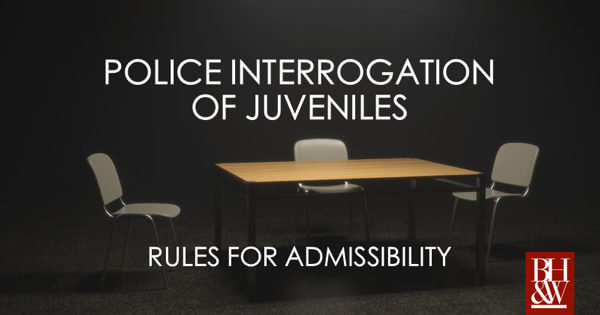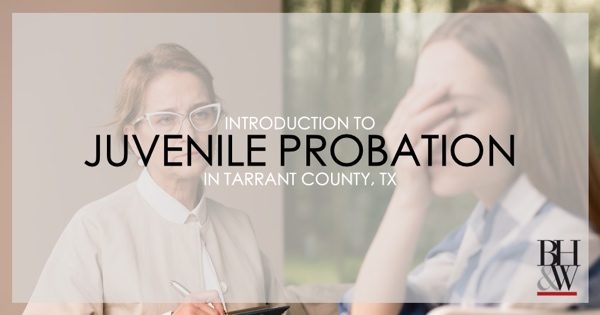 In Tarrant County, the Juvenile Probation Department is the intake agency for the county. This means that when a police officer files a case against a juvenile, it goes to Juvenile Probation before being sent to the District Attorney’s Office. The common practice is for cases to be referred by law enforcement officers without making an arrest. When this happens, there is a specific process in place with certain tasks that the juvenile intake officers must perform before a case is referred to the prosecutor. This article will walk you through this often-misunderstood process and explain why those juvenile probation officers do what they do.
In Tarrant County, the Juvenile Probation Department is the intake agency for the county. This means that when a police officer files a case against a juvenile, it goes to Juvenile Probation before being sent to the District Attorney’s Office. The common practice is for cases to be referred by law enforcement officers without making an arrest. When this happens, there is a specific process in place with certain tasks that the juvenile intake officers must perform before a case is referred to the prosecutor. This article will walk you through this often-misunderstood process and explain why those juvenile probation officers do what they do.
Overview of the Juvenile Intake Process in Tarrant County, Texas
When a case is first received by the Tarrant County Juvenile Probation Department, it is assigned to an intake unit. There are three intake units within the department. Once it is received by the intake unit supervisor, it is assigned to a court intake officer. The court intake officer is responsible for completing several tasks prior to court, including: conducting an intake appointment, administering assessments, making sure the juvenile is fingerprinted and photographed, and preparing a social history. The intake officer must also make a decision about what the next step in the process should be.
The Intake Appointment
The intake appointment is, arguably, the most important piece of the intake process in Tarrant County. It is also the part that is the most confusing to families and defense attorneys alike. While families and attorneys can, and do, refuse to participate in the intake appointment, nothing good comes from refusing. To the contrary, in some cases, cooperating with the probation officer by showing up for the intake appointment can help resolve the case without a referral to the prosecutor or court action. The defense attorney can be at the intake appointment if he wishes, but is not required to be.
During the intake appointment, the probation officer will explain the process to the juvenile and his family. They will also explain the charges and sometimes read a summary of the police report. They are not allowed to give a copy of the police report to the family. The intake officers do not ask the juvenile about the offense. Next, the officer will get some background information from the family. This information will include a family history, school history, and information on any other agencies that the family has been involved with. The officer will also ask about substance abuse, mental health, any prior hospitalizations, current and past medications, behavior at school and home, and family criminal history. The purpose in gathering all this information is to put together a social history, which is a comprehensive report, on the child that will guide the court and the attorneys involved when making decisions about the juvenile and the case.
Juvenile Assessments – PACT & MAYSI
During the intake appointment, the probation officer will also administer a couple of assessments to the juvenile. These are required, but the defense attorney can decline the assessments. The two assessments, which are given are called the PACT and the MAYSI.
The purpose of the PACT assessment is to determine the child’s risks to reoffend and needs for services. The results of the PACT assessment are included in the social history that is given to the court and attorneys. The MAYSI is designed to screen for problems with mental health, substance abuse, and/or suicide. If the results of the MAYSI show a concern for suicide, a no-harm contract will be completed with the child, and the officer will refer that child for services to help with the suicidal tendencies.
Fingerprinting and Photographing
The Texas Department of Public Safety (DPS) requires anyone who is charged with a crime, juvenile or adult, to be fingerprinted and photographed. This information is submitted to DPS and is included in the person’s juvenile or criminal history. When a person is arrested, these two things are done as a part of the book in process. However, when a juvenile case is referred to the Tarrant County Juvenile Probation Department without an arrest, the probation officer is required to get the fingerprinting and photographing done. This is usually done during the intake appointment. It entails the officer walking the child to the juvenile detention center where the fingerprint and photograph office is located and having it done. This is one part of the process, which cannot be waived or refused. It is required by the State of Texas in every case.
Probable Cause Decision Regarding the Case
The last aspect of the intake process is for the probation officer to make a probable cause determination on the case and decide what to do with the case. There are certain offenses that are considered “mandatory referrals” in Tarrant County. This means that the probation officer is required to refer the case to the prosecutor for review. The mandatory referral offenses are the more serious offenses and are usually felonies.
For offenses that are not mandatory referrals, the probation officer is responsible for making a decision about what to do with the case. The officer can, of course, refer a case to the prosecutor for review even if it is not a mandatory referral. However, they have other choices too. They can dismiss a case or offer the juvenile Deferred Prosecution Program (DPP), which is an informal probation period without charges being filed. In some cases, the officer may determine that if the child pays restitution, then the case can be closed out without any further action. If the child and family does not cooperate with the intake process, the officer is required to refer the case to the prosecutor. However, if the family does participate, they may find that they can take care of their case during the meeting with the intake officer, which is definitely to the child’s benefit.
Additionally, the officer may, and many times will, make referrals for services to the family based on their needs. These referrals could be for any number of resources available in the community. They could include referrals to MHMR, school programs, and counseling, to name a few.
The Tarrant County Juvenile Probation Department’s intake process is misunderstood many times by families and attorneys. It is not an adversarial process. The intake officers are neutral parties charged with gathering information, preparing social history reports, and making referrals for services. They are required by law to perform a few tasks, such as fingerprinting. However, their primary purpose is to help the child and the family navigate a system which may be unfamiliar and confusing. If you and your child are contacted about meeting with an officer for an intake appointment, it is preferable for you to cooperate so that you may have access to all possible options in your child’s case.
About the Author
Christy Dunn is a writer and attorney licensed to practice in Texas. She was a prosecutor for 15 years. The last five years of her prosecutorial career was spent in the Juvenile Division of the Tarrant County District Attorney’s Office. She has tried over 20 juvenile cases in Texas and multiple certification hearings.










